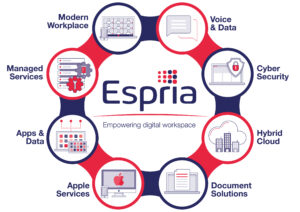In 2023, we saw significant advancements in cybersecurity. Whilst the impact of the Russia-Ukraine conflict opened the doors to cyber-attacks across many industries, it also revealed more about cybercriminals, and in particular, their organisational structures. However, the security landscape has shifted towards adopting zero-trust practices and cloud infrastructure, with operational teams now expected to understand and uphold ransomware protection practices.
Yet this basic level of security compliance is hardly a reason to celebrate, as cyber actors are unlikely to leave businesses alone when the promise of a cash pay-out remains. Cyber-attacks are becoming more sophisticated, almost surgical in their methods of exploiting weaknesses. To maximise profit and minimise the time spent per attack, threat actors are choosing to focus on targets with the highest value – i.e. where they can gain the biggest bang for their buck.
Dave Adamson, CTO at Espria believes that SMBs should not get complacent with security, as they are appealing targets for ransomware attacks. “Ransomware attackers are doing their homework, learning and understanding the value of specific, often smaller organisations, and tailoring their attacks to take advantage of available revenues. Simply asking for turnovers per day, with the threat that operations could be locked down for the equivalent of a week’s worth of revenue, is enough to get SMBs to pay up in the hope their attackers will move on.
“It is important to emphasise that the vast majority of attacks we observe are purely financially motivated. Where small business owners assume the value is in larger organisations, cyber attackers are more interested in a reliable pay-out, which is easier to achieve from weaker targets. By exploiting potential misconfigurations in cloud services or platforms, cyber actors expose sensitive data, compromise applications and disrupt operations.
“Whilst we live in a world with increasing automation, cybercriminals are going the opposite way. Often now it’s a human operative on the other end that’s attacking, rather than automated. This presents a bigger problem for security, as humans are blessed with the ability to adapt and problem-solve more effectively. But let’s not forget, they have the same access to AI tools that we do.
Adamson adds further that it’s not just ensuring operational teams are secure, as often overlooked vulnerabilities with C-suite operatives can lead to even greater catastrophe. “Last year, we saw an increase in executive impersonations, with a nearly 30% spike in fraud and piracy specifically targeting executives. C-level executives are often an organisation’s weakest security link; by having the greatest level of access within the company, they automatically become the most ideal target for attack, but when it comes to security practices they often go overlooked compared to the training of their teams.
Additionally, in increasing their online presence – whether it be for brand awareness, building reputation and credibility, or improving business outcomes – they increase their points of access tenfold, leaving more doors open for hackers to walk through. If their digital identity isn’t properly protected, this can be a massive liability for their wider organisation.”
Adamson believes shoring up C-suite vulnerabilities is a necessity for 2024 standard security procedures. “With emerging AI technology only boosting phishing and ransomware attempts, C-suite executives need to be more aware than ever of the access they might be accidentally handing over for exploitation. Even with the best safeguards in place, cybercriminals are now sophisticated enough to circumvent it; technology on its own isn’t enough to keep on top of these challenges.
By ensuring that organisational zero-trust practices and other standard security methods and training extend to top executives, SMBs can shore up their biggest security weakness and prevent total operational disruption.”
To read more about our Cyber Security Services, please click here.

